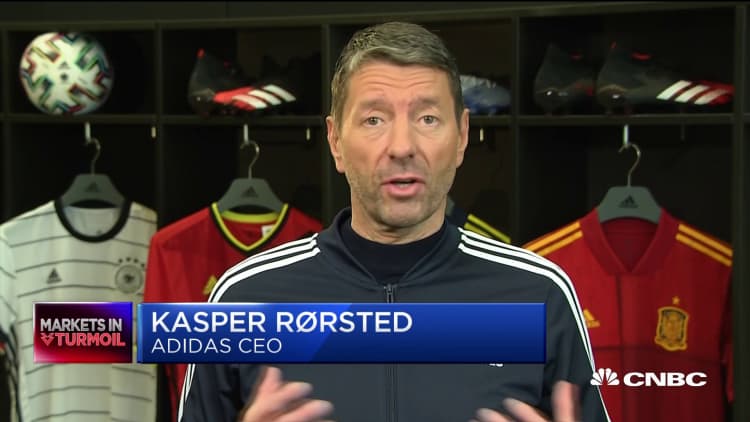
Adidas CEO Kasper Rorsted said the coronavirus outbreak has dealt "a painful setback" for the company's business, as it expects to take a sales hit and is already seeing traffic declines at some of its shops.
"In the sporting goods industry, you are really at the end of the food chain," Rorsted told CNBC's Sara Eisen Wednesday morning.
Before consumers get back to buying sporting goods, they will be stocking up on food and other daily necessities, to prepare for the virus, he said. "That is what we are seeing so far in the first quarter."
When it reported earnings Wednesday, Adidas said it expected first-quarter sales to drop by up to 1 billion euros ($1.14 billion) in greater China, and operating profit to decline by between 400 million and 500 million euros. That was after the company last month warned that its business in the greater China area had dropped by about 85%, year over year, in the period since the Lunar New Year on Jan. 25.
Adidas does about 23% of its business in China, and has 19% of its manufacturing capacity in the country, Rorsted said.
When a quarantine was issued for the region, he said 80% to 90% of business in Asia "stopped overnight." Adidas was losing about $100 million in revenue on a weekly basis, he said.
But traffic has picked back up in China since, he said. And manufacturing facilities in Asia are coming back online. But the outbreak, which began in China, is spreading to other parts of the world. Companies are having to figure out their plans in the U.S., as the virus becomes more widespread.
At first, COVID-19 was primarily hitting companies' supply chains in China. Now, it has become a demand issue on a global scale. U.S. consumers in recent days have been flocking to grocery stores and big-box retailers such as Costco to buy toilet paper, bottled water, cleaning supplies and canned goods.
"At this stage, [I] think the biggest impact right now is the concern people have," Rorsted said about the coronavirus in the U.S. "The uncertainty right now is bigger than the substance."
He said, meantime, Adidas' online traffic is up double digits compared with a year ago.
"This is going to force a quicker transformation to a more digital environment," he said about how consumers are changing how they shop amid the outbreak.
Adidas joins a list of consumer brands that expect the coronavirus epidemic to weaken demand for their products. Under Armour in February said it anticipated the outbreak in China to lower sales by roughly $50 million to $60 million during its fiscal first quarter. Dick's Sporting Goods said Tuesday it has tempered its full-year outlook due to COVID-19.
Adidas, meantime, had been seeing stronger growth in North America of late, thanks, in part, to the popularity around its Yeezy sneaker line with rapper Kanye West. It is also working with singer Beyonce on new merchandise.
Adidas is calling for revenue growth of between 6% and 8%, at constant currencies, in 2020. But it said this outlook could be changed still because of coronavirus.


